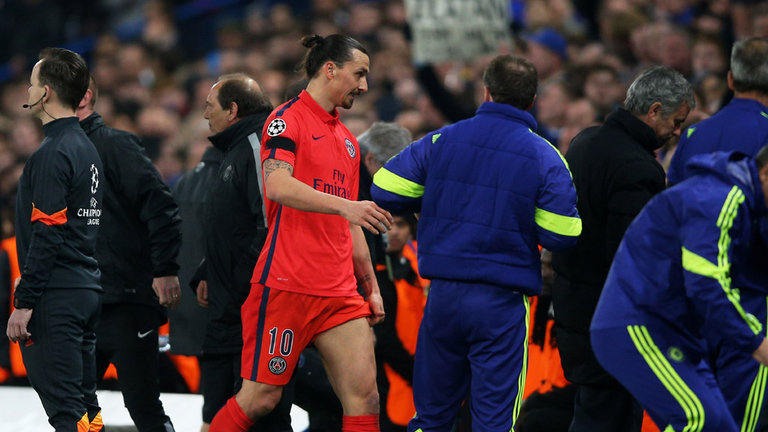
UEFA
has revealed it is considering measures to improve the behaviour of players
on the pitch.
Chelsea were criticised for the way they reacted to a tackle on Oscar by
Zlatan Ibrahimovic that saw the Paris Saint-Germain striker sent off as they
knocked Jose Mourinho’s side out of the Champions League on Wednesday.
The sides drew 2-2 after extra-time at Stamford Bridge following a 1-1 draw
in the French capital in the first leg as Laurent Blanc’s team advanced on
the away goals rule.
Chelsea skipper John Terry has since spoken out to defend his team-mates but
UEFA's head of media Pedro Pinto admits there are concerns within the
organisation over players putting pressure on officials during games.
"The president (Michel Platini) has recently been more concerned about the
behaviour of players on the pitch and it is something we are looking at at
the moment to see what can be done," said Pinto.
"Obviously, we would like to see an environment where players accept the
decisions taken and where they would not employ the tactic of pressure and
intimidation of the officials during the game.
"Right now, there is a strong interest internally to look at specific
initiatives and campaigns, and possibly regulations that would be a positive
influence on football and would hopefully have an impact on the behaviour of
players.
"We are aware there is concern regarding the behaviour overall... it is not
a good example for fans, for future players or for the image of the game."
'Triple punishment'
UEFA has also voiced concerns about the so-called ‘triple punishment’ rule,
whereby a player concedes a penalty, is sent off for denying a clear scoring
chance and serves an automatic suspension.
Shakhtar Donetsk player Oleksandr Kucher was sent off in the third minute of
his side’s 7-0 drubbing away to Bayern Munich for a foul on Mario Goetze
which led to a penalty, converted by Thomas Muller.
Pinto and UEFA believe the triple punishment rule places undue pressure on
match officials and have campaigned to amend them.
UEFA's suggestion that red cards should be replaced with a yellow in such
cases was turned down in February by the International Football Association
Board (IFAB), which has instead suggested removing the automatic suspension
aspect of the rule.
"We feel that the current triple punishment rule as it stands puts the
referee in a very tough position and leads to decisions which are made that
end up having quite a strong influence on the games," added Pinto.
"We feel it is too harsh and kills too many games. Even though the IFAB is
looking at to amend a rule for suspensions, that does nothing to change what
happens on the field.
"We are trying to make football the best spectacle possible for the fans and
the teams on the pitch and, unless it is obviously a 99 per cent scoring
position, we feel the rule as it stands is too harsh."
 top
top top
top UEFA
has revealed it is considering measures to improve the behaviour of players
on the pitch.
UEFA
has revealed it is considering measures to improve the behaviour of players
on the pitch.